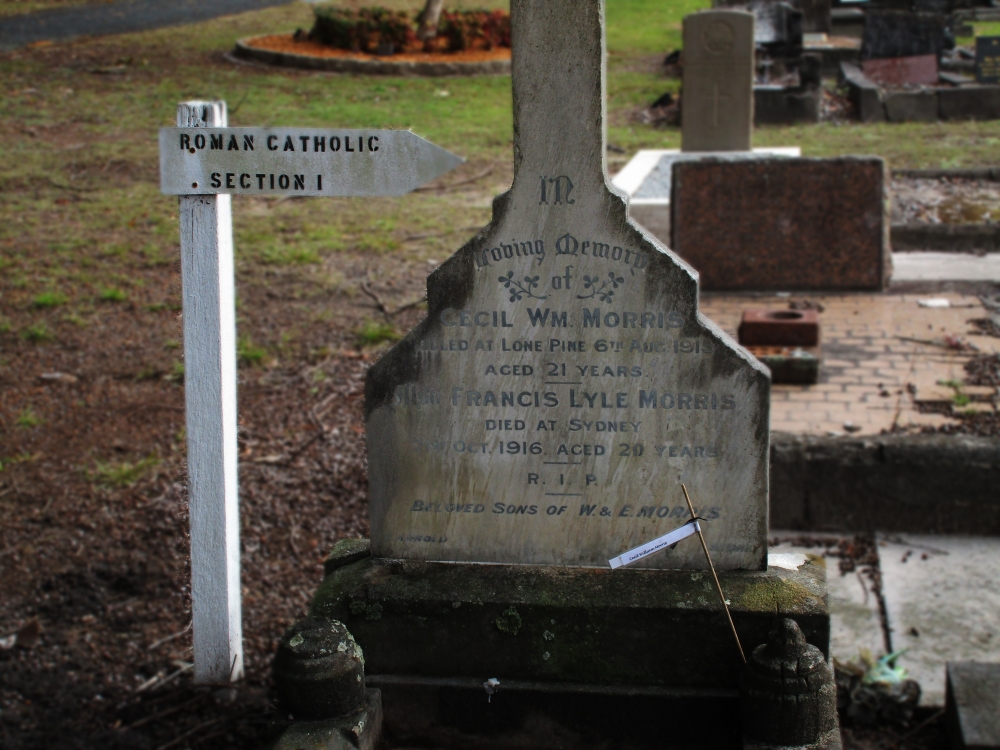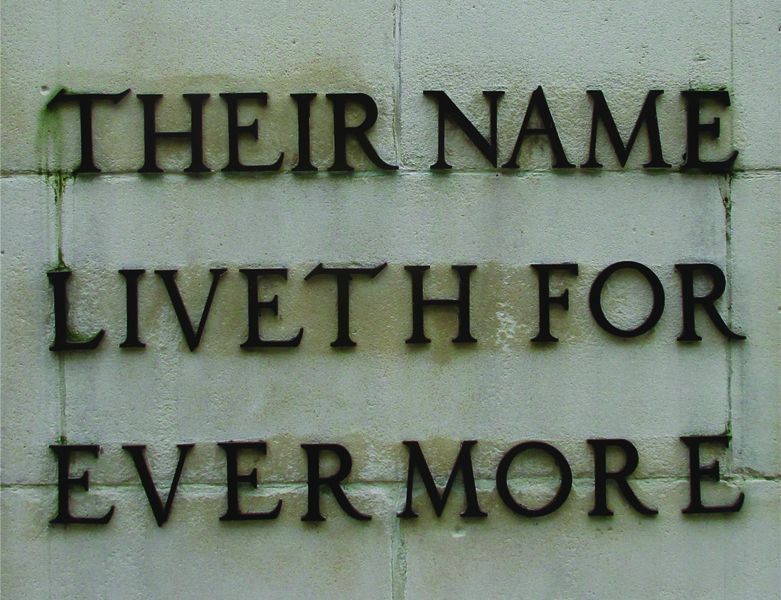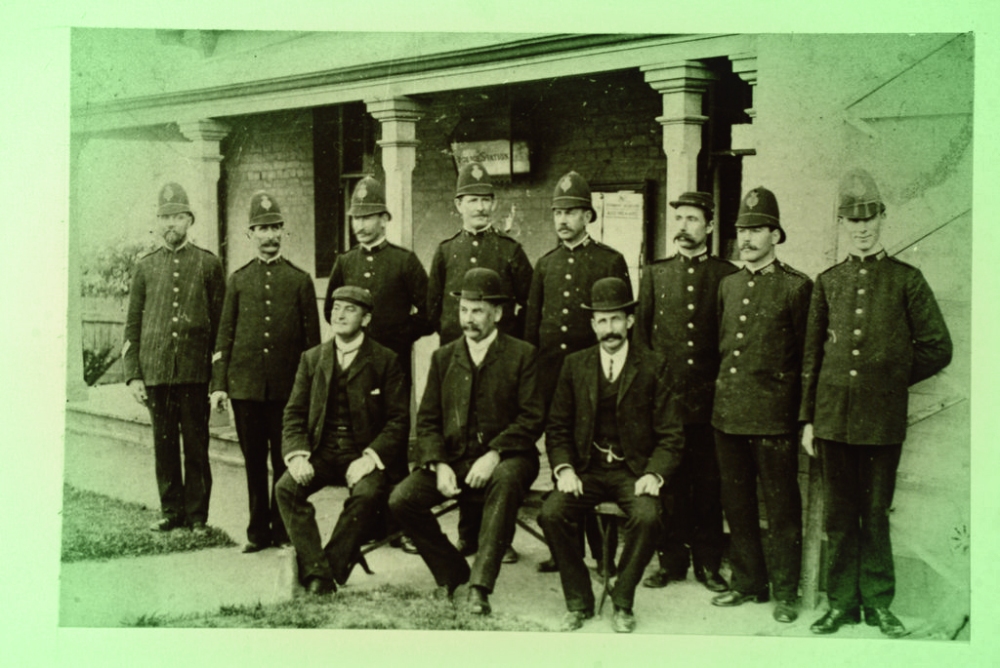Grave Site Roman Catholic Section 1 Row 1 Plot 1

Francis Lyle and Cecil William Morris
Both the sons of Sergeant 2nd class William Morris of Gosford Police Station,
Francis Lyle Morris died 21 October 1916, aged 20 years.
Cecil William Morris, died 6th August, 1915, aged 21 years. (as per the stone).
Unless otherwise stated all newspaper referrals are from the Gosford Times and Wyong District Advocate (1906 – 1954)
Francis Lyle and Cecil William Morris.
This is the grave that has caused the most historical anomalies in the written histories of Point Clare Cemetery in the past. The first internment occurred in January 1916 (Fred Cox), and with the Morris stone mentioning a date in 1915, the Morris’s grave site is often mistakenly listed as the oldest and first in the cemetery.
Cecil Morris died in 1915 at the battle of Lone Pine, none of the bodies from that battle were repatriated to Australia.
Francis Lyle Morris died just over a year from when the news of his brother’s death became known, yet not officially confirmed. When Francis Morris died in 1916, his father commissioned the headstone to have both the brother’s names on it, and as with the tradition the names were placed in the chronological order of the deaths and so Cecil’s name is above Francis’s.
So it is Francis’s burial plot and Cecil’s place of memorial.
The William Morris and family moved to Sydney in 1922 and lived in Abbotsford and are buried in Rookwood Cemetery.
We learn of Cecil’s war tale via a series of soldiers letters published by the local paper. There is below, a link to Cecil’s War record, it contains a particularly distressing letter (which has been included on this page scroll down) from Cecil’s father when he wants it confirmed that Cecil has indeed been killed on the war front.
 22nd January, 1915
22nd January, 1915
A Soldier’s Letter.
Mr. Henry Hastings, of Gosford, now with the Australian soldiers in Egypt, writes to his parents, Mr. and Mrs. William Hastings: —
Suez Canal, December 3. — We are told no censorship will be exercised over these letters, but even so, I cannot tell much for we have to little time before the mail goes. Cairo is to be our destination, so after all it is to be hot instead of cold weather, but ‘ so far, I have not found the heat as great as, our Australian heat.
We have just passed a French vessel going the opposite way. She greeted us with English, cheers, and our band played the Marseillaise. The Canal is just wide enough to allow two ships to pass. Each side seems to be endless stretches of sand, while every little way along are men on garrison duty, who are very much in evidence.
Our men are all well now. Ern Bailey (formerly schoolteacher at – Gosford), is very well, though like the rest of us, the heat has thinned him a bit. So are Donald, Ken, and Tom Robertson, and Cecil Morris; the Sergeant’s son.
Their friends might be glad to know, if they do not happen, to hear from them — and there are such hosts of letters, thousands in every mail, that no one knows whether many of them will ever reach their destination.
Young Burns, whose place adjoins “Fraternus ” on Mangrove Mountain, is on this boat, too, and Mitchell, who was in the Newcastle Scottish’ Rifles when George and I were there, and several men, too, whom I knew in Narrandera.
Alexandria, December 5th. — We arrived here yesterday, after -7% weeks. Two companies of infantry went out of our ship to-day. The New Zealanders left their ships yesterday, and with other troops have gone on to Cairo. We (the Army Medical Corps) will leave to-morrow. Everything is in readiness, and ‘Tights out” has just sounded, so I must , stop in a minute.
Egyptian; scenery so far seems to bentirely sand and rocks, but all the color of the towns makes them look like a bazaar or fancy fair.
Mena Camp, Pyramids, Cairo,
December. 7.— We arrived here at eight o’clock last night, and are camped right at the foot of the Pyramids, just about 10 miles out of Cairo. The British flag; is to be hoisted in Cairo to-morrow. The mail closes at once, and we are awfully busy, so I can’t write any more how. The ticket enclosed is a Cairo tram ticket. Loving greetings to you all, — HENRY.
The following link is to Henry Hasting’s War Record
http://recordsearch.naa.gov.au/SearchNRetrieve/Gallery151/dist/JGalleryViewer.aspx?B=4768273&S=1&N=27#/SearchNRetrieve/NAAMedia/ShowImage.aspx?B=4768273&T=P&S=27

14th May 1915
The following is an excerpt of the local paper,
Word has been received that’ Mr Cecil Morris, son of Sergeant Morris, Gosford, has been detained in Malta Hospital suffering from a bayonet thrust in the leg.
9th July 1915
Private Cecil Morris, son of Sergeant Morris, of Gosford, writes
from Imafa, Malta, under date May 5 : — . –
I suppose you have heard all – about our battle with the Turks. I am wounded in the leg and hand with shrapnel after having bad a fortnight’s fighting. We were landed, under a perfect hail off shot and shell, in small boats each containing about 50 men.
Some of the boats by the time they reached the shore had nothing but loads of mangled humanity. The Turks bad hundreds of machine guns td ‘ concealed batteries .. commanding the beach, and it looked an utter impossibility for our men to land.
However, we fixed bayonets, jumped out of the boats into the water up to our waists, and made for the shore. We were soon struggling with wire entanglements fitted under the water, again there was heavy slaughter among the landing parties before we finally got to the land. The Turks then endeavoured to drive us back into the sea with the bayonet, “but our chaps, ‘knowing what was in store, fought as never a fight has been waged before and gradually gained foothold.
The coast where we landed is something like Terrigal round about The Skillion, and we had to scale up these huge cliffs that were absolutely swarming with the enemy. They were yelling “Allah, Allah!” and sounding all the British bugle calls.
Others were shouting out orders to retreat, the object being to confuse us. But we had warnings about the enemy’s tactics and took no notice of them, beyond rushing their trenches with the bayonet.
The Australians fought with such grim tenacity, that the enemy gave way everywhere, and retired to the heights from where they fired volleys of rifle fire on the attackers below.
The Turks were officered by Germans. While we were landing, one of them stood up and yelled in English, ” Come on, you Kangaroo, you are not fighting Cairo now.
After an hour’s fighting, and with the assistance of the warships (Queen Elizabeth included), we had control of the hill and started to advance and built trenches under heavy fire for the day.
When advancing, the order was to run ahead about 20 yards, one at a time, and drop down, eventually forming one long line. During these operations’ I had a peculiar, creepy experience; I was advancing and ran up the required distance and dropped between two other comrades. I asked the one on my right the range and he did not answer. Turning to the one on my left I repeated the question, but no reply came. Both poor fellows were stone dead, shot through the head while still remaining in a firing position.
Needless to say, I soon shifted on. We were entrenched one night about 10 o’clock and the order came along from mouth to mouth, “Cease firing, Indians on the right about to charge.” So we stopped firing.
The Turks then came in thousands, but we mowed them down. This looked a bit “fishy,” and our officer told us to look out for anyone passing orders. Another order started to come along, and the chap that started it was grabbed. He turned out to be a German dressed in an Australian uniform. He has ceased to exist.
It was the second Sunday, at 8 o’clock at night, that I got hit. The wounds, however, were not serious, although I was packed off to the hospital at Malta. The British call us the ” white Gurkhas.” An English officer said he never saw men fight like the Australians, and that the fighting was worse than at Mons.
At time of writing I am doing well, but expect to be sent from here to England to get thoroughly well again. I suppose you know more about the Dardanelles in Australia than I have heard. We who have actually been in the firing line know little about things in general, the operations being so extensive. By the bye, when X was hit I was ordered to get back to the first dressing station.
While doing so as best I could, I met an old ” cobber ” and was shaking bands with him when a bullet came ” zip ” and planted itself in his shoulder. He coolly said ” Hold on, I will come with you.” Do not worry about “toe, I am not going to get knocked over/ . I have already had as many lives as a cat. I do not know where Lance Mason or any of the other Gosford chaps are. – Cecil.
This letter was published about a fortnight before his death during the battle of Lone Pine. Lance Mason to whom he refers to made it back after the war.
The following link is to Cecil William Morris’s War record.
http://recordsearch.naa.gov.au/SearchNRetrieve/Interface/ViewImage.aspx?B=7984266
 24th December 1915
24th December 1915
Killed at Gallipoli.
ANOTHER GOSFORD HERO.
In October last Private Mayo, writing home, reported that Private Cecil W. Morris, of Gosford, had been killed in the charge on the Turkish trenches at Lonesome Pine on 6th August last. No confirmatory news was received from the military authorities, and Sergeant Morris at once placed himself in communication with the Officer of Base Records.
Several cables were sent to and fro, and on 16th instant the following letter was received from the Department of Defence : —
‘ In continuation of letter dated 30th ultimo, a further cable has been received from Egypt that No. 160, Private C. W. Morris, 3rd Battalion, was last seen on the parapet of a Turkish trench seriously wounded. The foregoing is the result of an enquiry made to the officer commanding your son’s battalion. —Yours faithfully, J. M. Lean, Capt.”
The letter from the Defence authorities confirms the authenticity of Private Mayo’s statement, and there is little to ‘ doubt but that another of Gosford’s gallant young men has fallen in mortal combat against the enemies of our King and country Private Cecil Morris was the eldest son of Sergeant Morris, of Gosford, and, had life lived, would have celebrated his 21st birthday on 21st October. He was educated at Gosford, Burwood and Fort Street Superior Schools, and was last employed as clerk in Messrs. Goodall’s office, Sydney. On the outbreak of war he enlisted in the 1st Expeditionary Force and was sent to Egypt and later to the Dardanelles. He was twice wounded prior to the storming of the Turkish trenches at Lonesome Pine. As already stated, Private Morris was but 21 years of age, and was an all-round athlete, just the type of young Australian that would play his part when acts requiring, grit and courage were called for, otherwise he would not have received, his death-blow on the parapet of the enemy’s trenches. We deeply sympathise with the parents and family – relatives in their sad bereavement, but they have the consultation of knowing that their brave young soldier boy died doing his duty with his face to the foe, as so many of our gallant young Australians have done in this cruel and world-wide war.
Note : It took a little while for Cecils death to be officially confirmed to the Morris family, the official date of death, from the armies records is the 7th of August 1915, but the family having heard before this official notification of his death, had the date of the begining of the Battle of Lone Pine put on the stone… (6th August).

9th August 1917
ROLL OF HONOR.
MORRIS. — Killed in action at Lone Pine, 7th August, 1915, our dearly loved son and brother, Private Cecil Wm Morris. Aged 21 years 10 months.
No one he loved was by his side,
To bid a fond farewell ;
Or give one word of comfort,
To him they loved so well.
Inserted by his father and mother, sisters and brothers.

Francis Lyle Morris
Roman Catholic Section 1 Row 1 Plot 1
26th October, 1916
Obituary.
It is with feelings of extreme regret that we are called upon this week to report the death of Francis Lyle Morris, second eldest son of Sergeant William Morris, of Gosford.
The sad event took place in the Sydney Hospital on Friday morning last, the cause of death being *Bright’s disease.
The deceased who was 21 years and 1 month of age, was born at Carinda, and finished his education at Burwood Superior Public School. He entered the Postal Department as a telegraph messenger at Gosford Post Office, and at the time of his death was relieving Postmaster at Cessnock.
Four weeks ago he was taken seriously ill, and admitted to Cessnock Hospital. Sergeant Morris was later on sent for, and the young man was subsequently removed to Sydney Hospital, where the end came a week after admission.
Young Mr. Morris was a gentlemanly and courteous official, and was popular with all sections of the community. He had reached a high standard in the Service,’ and was a brilliant operator. His elder brother, Cecil, was killed at Lone Pine. At that time Lyle, though under age, was also in khaki, but withdrew in response to his mother’s pleadings. The remains were brought to Gosford and interred in Point Clare cemetery on Saturday afternoon. The funeral was largely attended, and Rev. Father Kelly conducted the burial service.
*Bright’s Disease is a term for Renal/Kidney failure.







 22nd January, 1915
22nd January, 1915
 24th December 1915
24th December 1915

